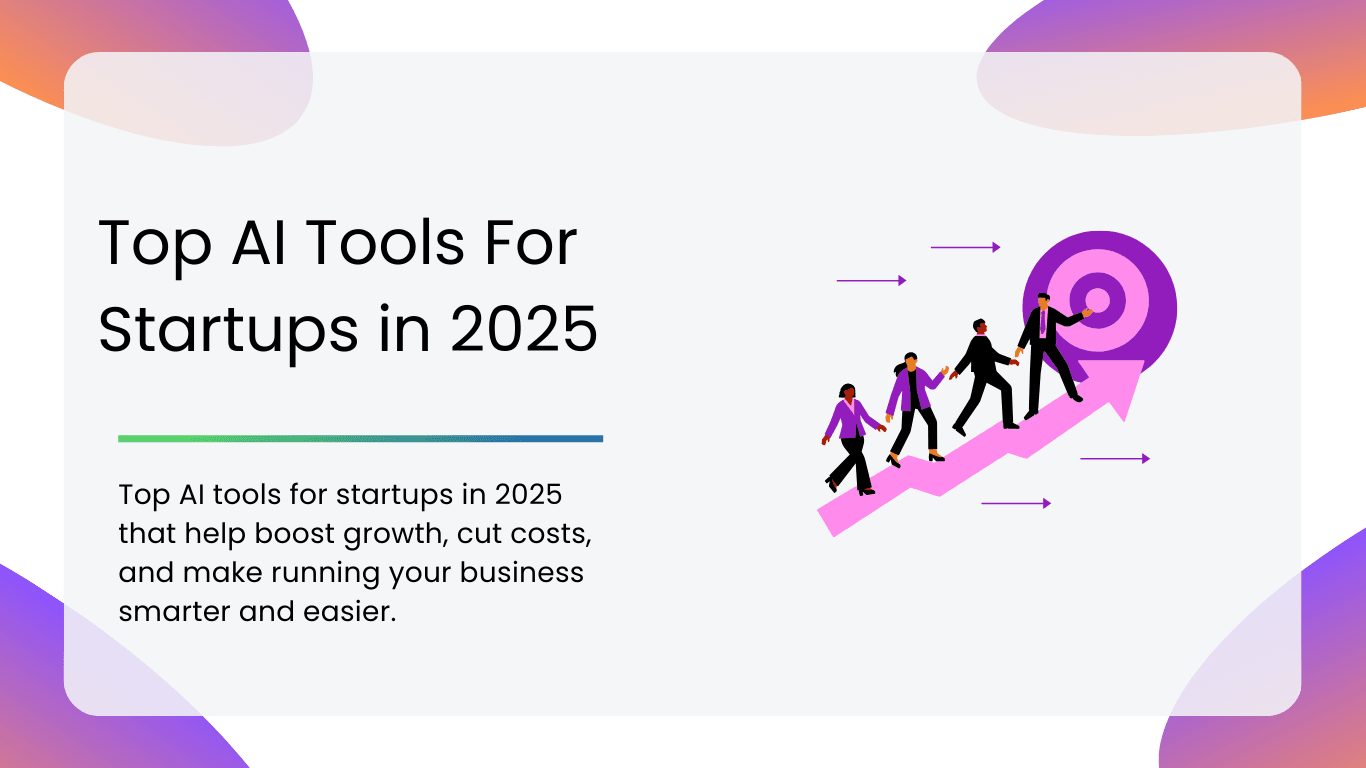Starting a business has always been a mix of long nights, bold ideas, and figuring things out on the fly. But in 2025, the journey feels different since AI has become a real game-changer for startups. These tools are no longer just add-ons. But they feel more like an extra teammate who works around the clock and takes on tasks that used to eat up all your time.
From managing budgets to building smarter marketing plans to turning raw data into clear insights, AI is helping small teams to do big things without burning out. The challenge is not finding tools, but finding the right ones. There are countless options out there, and only a few truly make a difference.
To save you time, we’ve pulled together the top AI tools in 2025 that are actually making life easier for startup founders.
Why Startups Need AI in 2025
- Do More with Less: Most startups run on tight budgets and small teams. AI helps you stretch your resources by taking over repetitive work-life scheduling, data crunching, or even customer support.
- Stay Ahead of Bigger Competitors: AI gives small players access to the same kind of insights and tools that big companies use, thus leveling the playing field without the huge price tag.
- Save Time for the Work That Matters: Instead of spending hours writing reports, analyzing trends, or testing marketing campaigns manually, AI handles the heavy lifting so that you can focus on strategy and growth.
- Make Smarter Decisions, Faster: AI tools can spot patterns in data that humans might miss. That means better calls on what product to build, how to price it, or where to invest your energy.
- Keep up with the Pace of Change: Trends move faster than ever. AI helps startups adapt quickly by providing real-time insights and solutions instead of relying on guesswork.
Key Factors to Consider When Choosing AI Tools
- Ease of Use: The best tool is the one your team can actually use. If it takes weeks to figure out, it will just end up slowing you down.
- Cost vs. Value: Some AI tools look fancy but don’t really justify the price. Focus on whether they save you enough time or money to actually be worth it.
- Scalability: Pick tools that can grow with your startup. What works for a three-person team should still be useful when you hit thirty.
- Integration with Your Workflow: AI is most powerful when it fits smoothly into the tools you already use, like your CRM, project manager, or marketing platforms.
- Data Privacy & Security: Startups deal with sensitive information, too. Make sure the tools you choose handle your data responsibly and keep it safe.
Table of Contents
| 1. ChatGPT |
| 2. Notion AI |
| 3. Jasper AI |
| 4. Zapier |
| 5. GitHub Copilot |
| 6. Fireflies.ai |
| 7. Canva |
| 8. ClickUp AI |
| 9. Grammarly |
| 10. Synthesia |
Top AI Tools for Startups in 2025
1. ChatGPT
ChatGPT in 2025 is much more than a chatbot. It acts like a full AI assistant that helps with writing, coding, planning, data analysis, and even understanding images and audio. You can upload files for it to analyze, ask it to debug code, or have it research topics in real time with web access. It remembers your preferences and past conversations to make interactions smoother. Plus, you can create your own customized versions of ChatGPT for specific tasks or industries. This makes it a powerful tool for startups needing flexible, intelligent help across many areas.
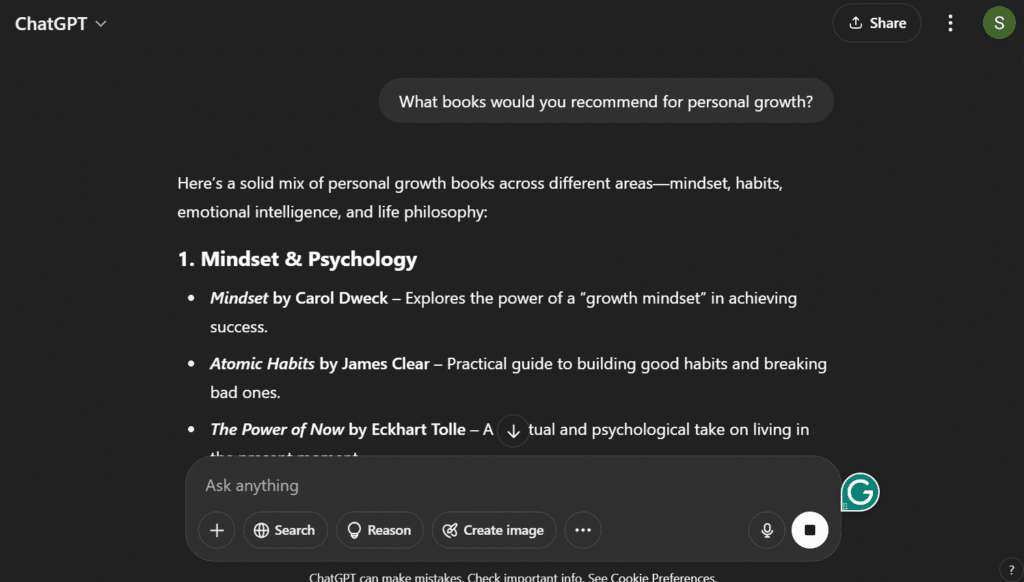
Key Features
- Generate Clear Text: Craft emails, blog posts, reports, and more.
- Understand the Context: Remembers your preferences and past chats.
- Handles Files and Images: Upload PDFs, spreadsheets, or pictures for analysis.
- Talk Naturally: Voice mode lets you chat hands-free.
- Use Tools and Agents: Automate research, coding, and more.
- Control Privacy: Manage what ChatGPT remembers about you.
- Customize your Assistant: Build personalized GPTs for unique needs.
Pros
- Incredibly versatile across different startup tasks.
- Automates repetitive work and complex projects.
- Regularly upgraded with new features.
Cons
- Sometimes makes mistakes or needs fact-checking.
- Advanced features like custom GPTs or web browsing cost extra or require setup.
2. Notion AI
Notion AI is built into a popular workspace tool that many startups use for notes and project management. In 2025, it’s more than just a writing helper. It can generate content, summarize long documents, analyze data visually, and even provide smart suggestions on what to do next, all without leaving your workspace. It connects with other apps like Google Drive and Slack to keep your workflow smooth, making it a great all-in-one assistant for teams and solo founders alike.
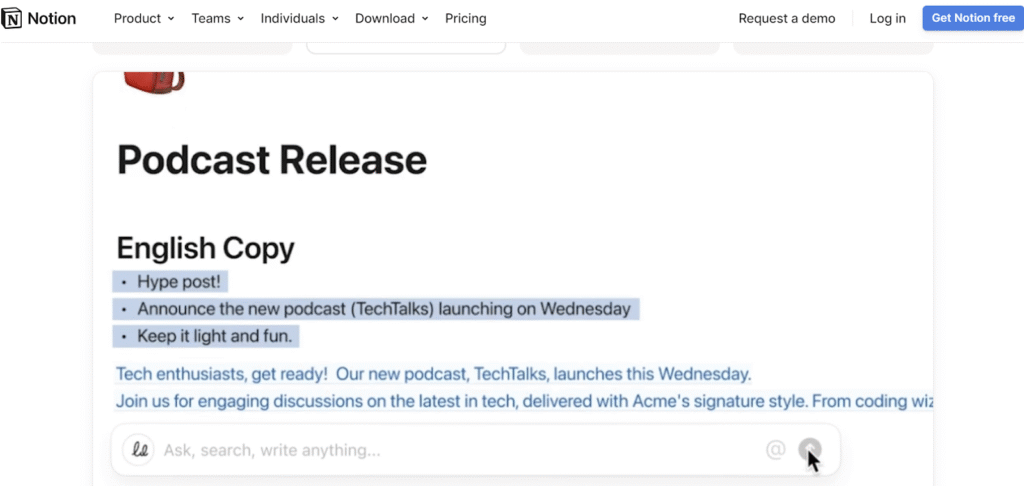
Key Features
- Suggest Content Automatically: Drafts, meeting notes, and ideas appear when you need them.
- Analyze Data Visually: Makes complex info easier to grasp with charts and visuals.
- Predict Your Needs: Offers next steps and project outlines tailored to your work.
- Connect with Other Tools: Integrates with popular apps and platforms
- Chat Inside Notion: Ask questions or get help without switching apps.
Pros
- Works well for collaboration and team projects.
- Fits right into existing Notion workflows.
- Offers personalized, useful suggestions.
Cons
- Mostly limited to paid Business or Enterprise plans.
- It can get pricey for very small startups or individuals.
3. Jasper AI
Jasper AI focuses on helping startups create marketing content faster and easier. It comes loaded with templates for blog posts, social media ads, emails, and product descriptions, making it a handy tool for non-writers and busy founders. Jasper also helps you keep a consistent brand voice and optimize content for SEO. Its deep integrations with SEO tools mean that you’re not just creating content quickly, but you’re also boosting your chances of getting noticed online.
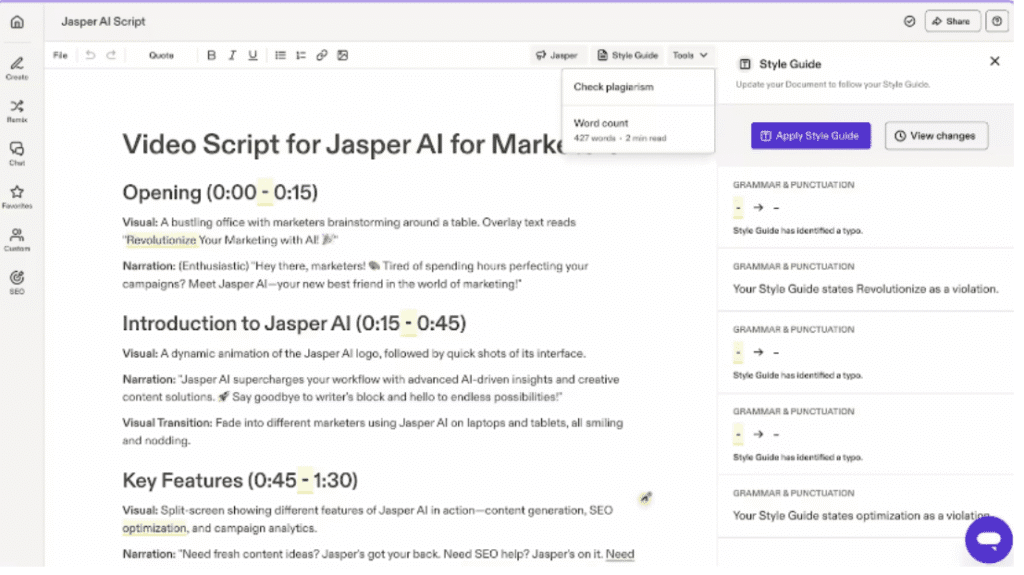
Key Features
- Use Ready Templates: Over 50 templates for content of all kinds.
- Create SEO-Friendly Text: Write content designed to rank well on search engines.
- Keep Your Brand Consistent: Use style guides for a unified voice.
- Integrate with SEO Tools: Connect with providers like Surfer SEO.
- Automate Content Review: Get suggestions to improve quality and clarity.
Pros
- Saves time on content creation and marketing.
- Helps founders scale their content quickly.
- SEO features improve visibility beyond just speed.
Cons
- Premium features and SEO modes can add to the cost.
- Mostly focused on writing tasks, less on other needs.
4. Zapier
Zapier is a powerhouse for automating repetitive tasks across hundreds of apps without writing a single line of code. In 2025, it’s even smarter with AI-powered workflow building and real-time assistant features. You can chain multiple actions into one workflow, set conditions, schedule tasks, and even write custom logic with a bit of code. Its AI helps you build zaps faster by understanding your goals and suggests fixes if something goes wrong. For startups trying to scale operations without adding headcount, it cuts down manual work while making cross-app processes smoother.
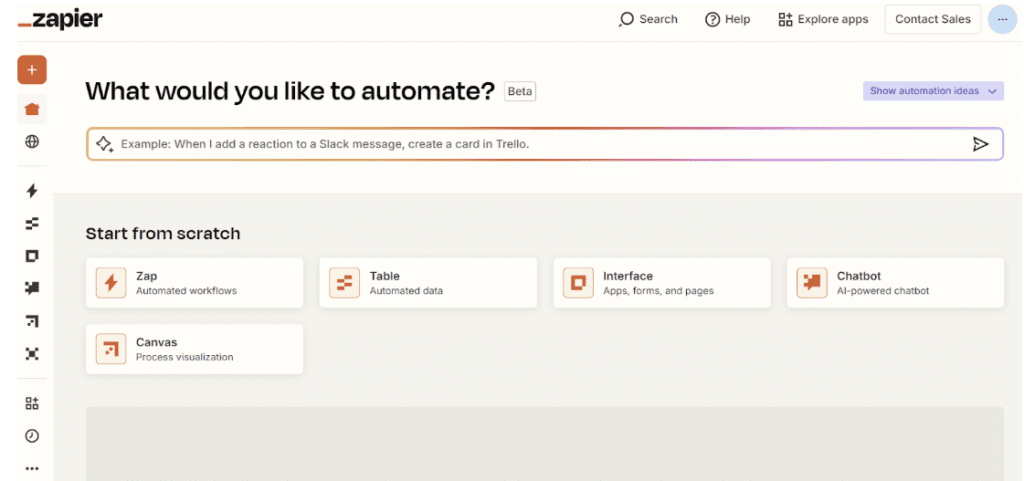
Key Features
- Automate Tasks Quickly: Connect apps and build triggers with drag-and-drop ease.
- Multi-Step Workflows: Chain several related actions into one Zap without hassle.
- AI-Powered Builder and Copilot: Create zaps by typing what you want and get real-time help fixing errors.
- Conditional Logic and Scheduling: Customize workflows to run only when certain conditions are met or at specific times.
- Custom Scripting with Functions: Add JavaScript snippets to handle advanced data manipulation.
- Chatbots for Support: Build AI chatbots trained on your documents for help desks or FAQ answering.
Pros
- Easy to use for non-techies with lots of templates.
- Great for saving time on repetitive tasks.
- AI features speed up complex workflow building.
Cons
- Pricing can get high for big teams or heavy use.
- Some app integrations have limitations on what they can automate.
- May not handle very complex logic as well as specialized platforms.
5. GitHub Copilot
GitHub Copilot is like having a pair-programmer AI ready to help you write and understand code faster. It integrates directly into popular code editors and suggests complete lines or blocks based on what you’re working on. In 2025, Copilot has improved contextual understanding, supports more languages and frameworks, and even helps with documentation and testing. For startups building software products, Copilot is a serious time saver that reduces debugging and accelerates development without replacing the need for coding skills.
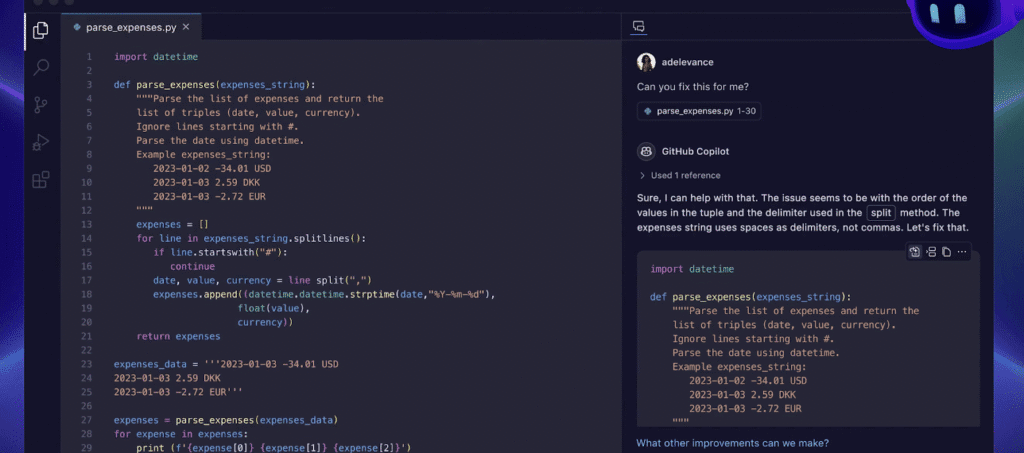
Key Features
- Code Autocomplete Suggestions: Offers smart code completions and snippets.
- Support for Many Languages: Works with Python, JavaScript, C#, and many others.
- Works in Multiple Editors: Integrates with VS Code, JetBrains IDEs, and more.
- Assists with Tests and Docs: Can generate unit tests and code explanations.
- Learns from Context: Tailors suggestions based on your file and project.
Pros
- Speeds up coding and reduces repetitive typing.
- Helps onboard junior developers by example in real-time.
- Supports a wide range of coding languages and tools.
Cons
- Not perfect, sometimes suggests irrelevant or insecure code.
- Relies on an internet connection and subscription for full access.
- Cannot replace deep programming knowledge or architectural decisions.
6. Fireflies.ai
Fireflies.ai is a meeting assistant that records, transcribes, and summarizes your calls automatically. It’s designed to save startup teams time by capturing important details without manual note-taking. Fireflies integrates with major video conferencing platforms and can even populate CRM entries or send follow-up emails based on meeting content. For startups that are juggling multiple calls and needing clear action points, it keeps everyone on the same page and reduces meeting fatigue.
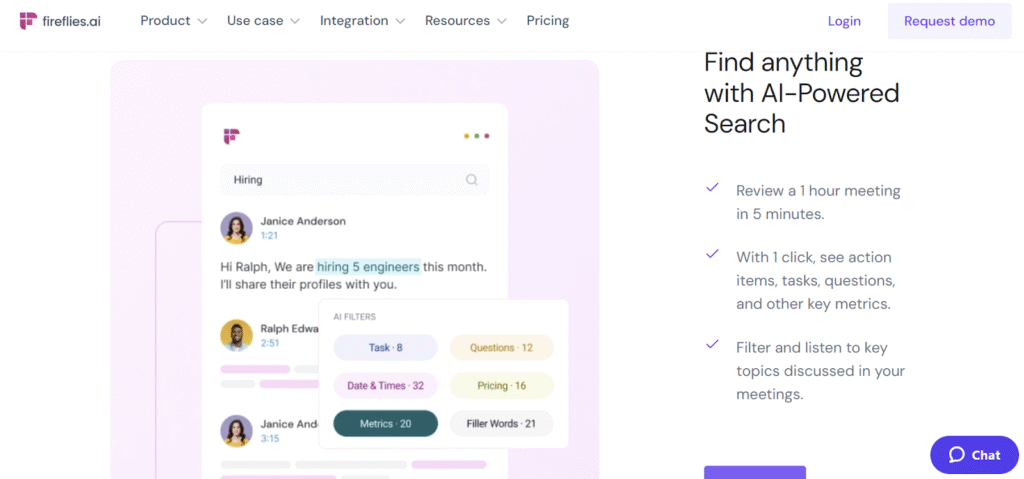
Key Features
- Record and Transcribe Meetings: Capture every detail without lifting a finger.
- Generate Searchable Transcripts: Easily find past discussion points.
- Create Meeting Summaries and Highlights: Get automated action items and key takeaways.
- CRM Integration: Sync notes directly to sales or project tools.
- Voice Commands and in-meeting Notes: Add quick highlights or comments during calls.
Pros
- Eliminates tedious manual note-taking.
- Makes meetings more productive and trackable.
- Useful integrations with CRM and communication tools.
Cons
- Accuracy depends on audio quality and accents.
- The free plan has limits on transcriptions and storage.
- Some features are locked behind higher-tier plans.
7. Canva
Canva is a design platform that makes creating visuals easy, even if you’re not a graphic designer. In 2025, it’s packed with AI features that help you generate images, edit photos, and create presentations or social media content quickly. For startups needing to produce branded content fast without hiring designers, Canva is a go-to. It offers templates, brand kits, and collaboration features so teams can stay consistent and productive.
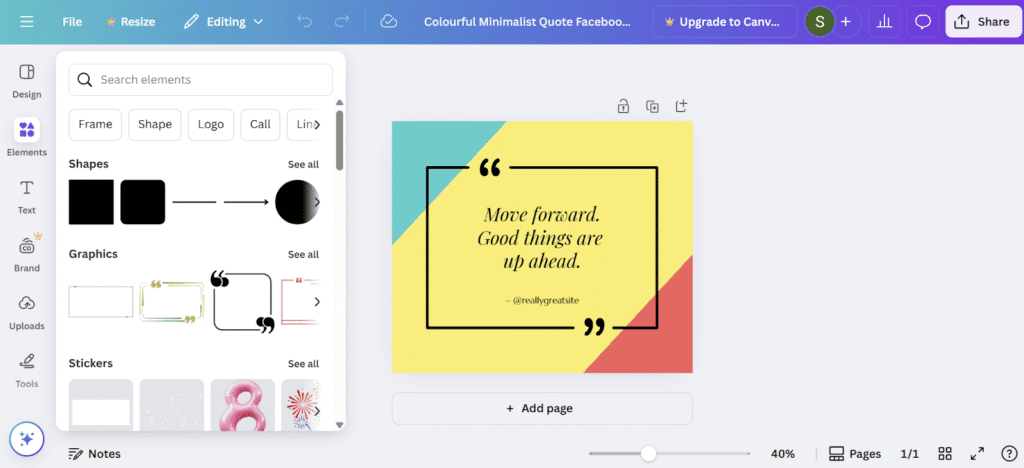
Key Features
- AI Image Generation & Editing: Create or modify visuals using text prompts or easy tools.
- Ready-made Templates: Choose from thousands of templates for social, presentations, flyers, and more.
- Brand Kits: Store logos, colors, and fonts for consistent branding.
- Collaborate in Real-Time: Work with your team on designs simultaneously.
- Export in Multiple Formats: Download your work for web, print, or video.
Pros
- User-friendly with no design experience needed.
- Speeds up creating professional visuals.
- Great collaboration tools for teams.
Cons
- Some premium assets and features require a paid subscription.
- Advanced editing is limited compared to professional software.
- It can be overwhelming with so many options for beginners.
8. ClickUp AI
ClickUp AI is built right into the ClickUp workspace and is designed to take busywork off your plate and make managing projects easier. It summarizes long documents, generates subtasks and action items from discussions, drafts emails, and even transcribes voice notes. What makes it stand out is how well it connects with your existing projects and workflows, pulling on context from tasks, docs, meetings, and also chats to provide spot-on assistance. It can tailor its help to your role, whether you’re a project manager, developer, or sales rep, saving you time while keeping everyone on the same page.
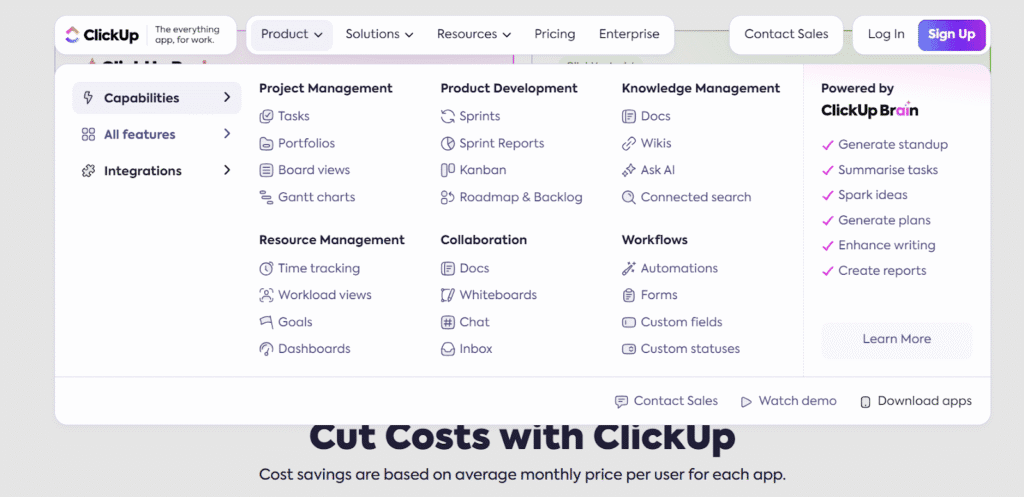
Key Features
- Summarize Information Fast: Create quick recaps from docs, meetings, or chat threads.
- Generate Subtasks and Action Items: Break down big projects into smaller, manageable tasks automatically.
- Draft Emails and Documents: Produce professional messages and content based on simple prompts.
- Transcribe Voice Notes: Convert meeting or voice recordings into written text for easy sharing.
- Role-Specific Insights: Get customized summaries and updates for your job functions.
Pros
- Saves time by reducing manual note-taking and task management.
- Fits naturally into your existing workflow inside ClickUp.
- Useful for teams of any size with clear role-based support.
Cons
- Some features are newer and may need familiarization.
- The best experience requires full ClickUp workspace adoption.
- AI may occasionally miss context in complex projects.
9. Grammarly
Grammarly is the next step in AI-powered writing help from Grammarly, which is designed to do more than just grammar checks. It offers content generation, rewriting, and tone adaptation, all tailored to your style and purpose. Whether you need a quick email draft, a creative article start, or a more professional report, GrammarlyGo adapts on the fly, helping you write clearly and confidently. It also provides real-time suggestions while you write, making editing seamless and natural for busy founders and their teams.
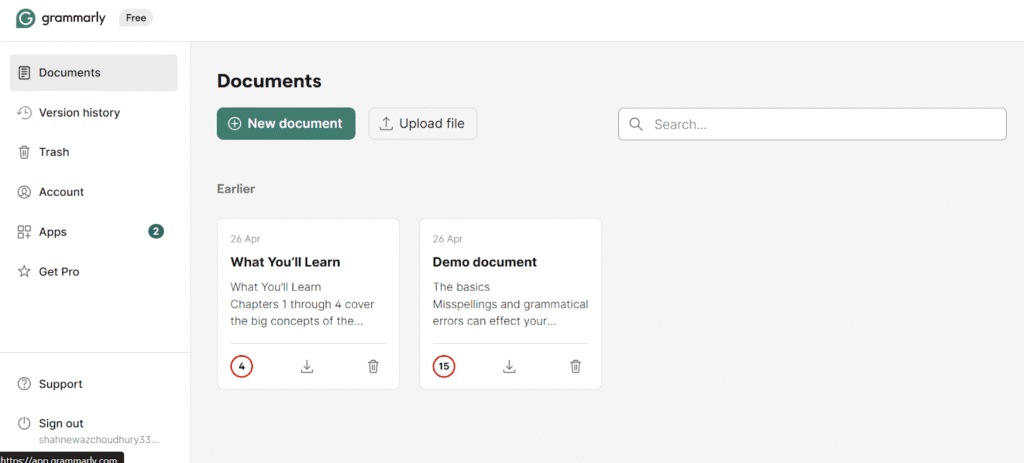
Key Features
- Generate Content Instantly: Get drafts for emails, posts, or reports from prompts.
- Rewrite and Improve Text: Polish sentences or change tone with a click.
- Tone and Style Customization: Match your writing to casual, formal, or friendly vibes.
- Real-Time Grammar and Clarity Checks: Edit as you type for mistake-free writing.
- Plays Well with Multiple Platforms: Works on browsers, apps, and desktop.
Pros
- Helps non-writers create professional content fast.
- Easy to use with instant feedback and corrections.
- Supports multiple tones and styles for different audiences.
Cons
- Requires subscription for full features.
- Not designed for heavy creative writing or complex storytelling.
- Sometimes may offer suggestions that change meaning.
10. Synthesia
Synthesia is a video creation platform that uses AI to generate professional-looking videos from text. Instead of spending hours recording or hiring actors, you can create presentations, training videos, or marketing clips with virtual avatars that speak your script in multiple languages. In 2025, it will have improved customization, better avatar realism, and easier editing tools, making videos accessible for startups without messy production. It’s ideal for startups looking to communicate clearly and quickly in video format, especially for remote teams and training.

Key Features
- Create Videos from Text: Just type your script and pick an avatar or upload your own.
- Multiple Languages and Accents: Reach global audiences with localized video content.
- Customizable Avatars and Backgrounds: Match brand and style effortlessly.
- Easy Editing Tools: Change text, visuals, and audio without starting over.
- Integrate with Other Platforms: Publish directly to YouTube, websites, or LMS.
Pros
- Makes video creation fast and affordable.
- No filming or editing skills required.
- Great for online training, marketing, and onboarding videos.
Cons
- Avatar expressions can feel slightly robotic sometimes.
- Limited flexibility compared to full video editing software.
- Some features are behind higher-tier pricing plans.
Future of AI for Startups
- AI will do more than just suggest: In 2025 and beyond, AI isn’t just answering questions or creating content for you on command. It’s moving to actually completing full workflows and solving business problems by itself. Startups will use AI agents to automate complex tasks like legal work, customer support, and sales processes, that will save huge amounts of time and resources.
- Hyper-Personalized AI will Guide Smarter Decisions: AI will get better at making predictions customized specifically to each business and user. By analyzing real-time data from many sources, startups will use AI to understand customer behavior, forecast trends, and offer personalized experiences before customers even realize what they want.
- AI-Powered Business Consultants will become Common: Instead of traditional consultancy, startups will lean on AI advisors who analyze markets, competitors, and internal data to suggest growth strategies. These AI consultants will be faster and available 24/7, thus helping founders make data-driven decisions with confidence.
- More Startups will embed AI deeply into their Products: Investors are looking for startups that not only use AI internally but also build AI-driven products and services. The future favors companies that integrate AI into every layer of their offering, from customer interactions to backend processes, making AI a core part of that business model.
- AI will Fuel Autonomous Businesses: Businesses will increasingly rely on AI to operate with minimal human intervention. From supply chain management to financial operations and marketing, startups will automate many functions fully, freeing founders and teams to focus on vision and innovation.
Conclusion
AI isn’t a finish line, but it’s a starting point for startups ready to rewrite the rules.
It pushes boundaries, sparks new ideas, and takes care of the routine so founders can focus on what really matters.
The future belongs to those who don’t just use AI but actually learn to flow with it, experiment boldly, and trust it as a partner, not a magic fix.
So, take the leap. The next breakthrough might just be an AI-powered idea waiting to happen.
If you’re captivated by the potential AI brings to the table, don’t miss our other blog posts, where we take a deeper dive into the world of AI-driven tools:
- Best AI Productivity Tools in 2024
- Top 10 AI Agencies in India
- Top 16 AI Logo Design Tools
- Top AI tools for task automation
- 10 Creative AI Design Assistant Tools for Marketers
FAQs
Start by identifying the specific problems or tasks you want AI to solve. Look for tools that fit your budget, are easy to use, and integrate well with your existing systems. Test a few with free trials or pilots to see which deliver real value before committing long-term.
Not always. Many AI tools today are designed for non-experts with simple interfaces. However, having some basic understanding helps. Startups can also partner with consultants or use pre-trained, low-code solutions to overcome gaps in AI knowledge.
Challenges include data quality and availability, aligning AI with business goals, integration with existing workflows, and managing costs. Start small with focused pilots, train your team, and measure impact before scaling.
Very important. Startups should choose AI tools that follow strong privacy and security practices, especially if handling customer data. Make sure tools comply with relevant regulations and offer controls over data storage and sharing.
Disclosure – This post contains some sponsored links and some affiliate links, and we may earn a commission when you click on the links at no additional cost to you.
